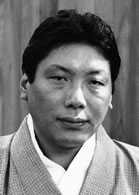


Dennis Merzel (1944) had his first awakening experience in 1971. In 1972 he started formal Zen Buddhist
training at the Zen Center of Los Angeles under Maezumi Roshi, who gave him the Dharma name Genpo. In 1980 he received Dharma transmission
(authorization to teach) from Maezumi Roshi.
The Myth of Enlightenment is a question and answer session with Genpo Sensei that took place in 1988.
In this Q&A, Genpo teaches that enlightenment is the realization that there is no (unchanging, permanent) self. This is fundamentally liberating, because
consequently there is no longer a false (sense of a permanent) self that needs to attach to, or identify with anything to confirm its existence. If we don’t try to have this realization,
it is like sitting down in the prison of our mind and we just suffer. So we have to try and make a big effort to have this realization and yet that efforting is what
keeps us from ‘succeeding,’ because there is no self that can get enlightened in the first place. So ultimately we have to fail completely in our effort to attain enlightenment,
for a true opening (in our illusory sense of self) to occur.

Chögyam Trungpa Rinpoche (1939-1987) was the 11th descendent in the line of Trungpa tulkus, teachers of the Kagyu lineage, one of the four main schools of Tibetan Buddhism.
In his book “Cutting Through Spiritual Materialism,” Trungpa gives an analysis of how the ego can convert anything to its own use, even spirituality. According to Trungpa, the main point of any spiritual practice is to step out of the bureaucracy of the ego and its constant desire for a higher, more spiritual version of knowledge, religion, virtue or whatever it is that a particular ego is seeking.

Aziz Kristof was born in Poland in 1962. From his late twenties to his mid-thirties he followed the path of Self–realization according to the Buddhist as well as the Hindu traditions, practicing for years in Korea, Japan, Thailand and India.
The teachings of Aziz Kristof form a comprehensive and all–explaining view of enlightenment. A view in which the various insights of the different schools of enlightenment are seen in a complete and uniting context. After studying his teachings carefully, I made this summary of his teachings (in 2005).

Rani Willems was born in The Netherlands in 1951. After having been a disciple of Osho for 16 years, she became a spiritual teacher herself, holding satsangs and retreats all over the world.
While being a teacher, the death of a close friend made her experience a lot of pain and heartbreak, which caused the disappearance of ‘the bliss and joy of the enlightenment high.’ This came as a shock to her. She had not thought that it would be possible to be ‘thrown out of paradise.’

Ramesh S. Balsekar (1917-2009), a commerce graduate from the University of London, started his working career in the Bank of India in 1940. He rose through the ranks and retired in 1977 as bank President. Shortly after his retirement, Ramesh met with Advaita teacher Nisargadatta Maharaj. Not long after, Ramesh had his enlightenment experience.
The text “Creating Order Out of Disorder: The Theory of Probability — The Law of Large Numbers” is a paper by Ramesh. In this paper he gives a theoretical framework for the impossibility of an individual autonomous free will. His argument is based on the statistical law of large numbers which, according to Ramesh, in fact determines how our lives turn out.

Tony Parsons (1933) communicates a message of uncompromising non–duality, dating back to the 1950’s when, at the age of 21, he had his first spiritual awakening experience.
Many spiritual traditions hold the view that enlightenment can be attained by making a personal effort. Tony Parsons renounces this view because this view is not in accordance with a realization that seems to be inherent in enlightenment: That there is no self.
If there is no self, there is no personal doership and so one cannot do anything ‘oneself’ to assist the arrival of enlightenment.
The following text by Tony Parsons is a clear statement about his view of enlightenment.